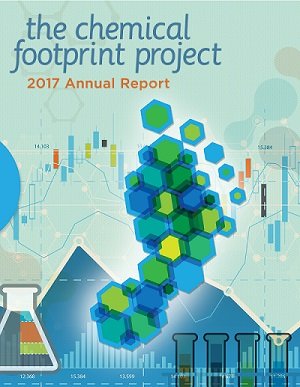
CONTACT: Alison Poor, Alison@cleanproduction.org, 781-391-6743 x110
FOR IMMEDIATE RELEASE: August 2, 2017
Companies with over $670 billion in revenue participate in the Second Annual Survey
Somerville, MA – The Chemical Footprint Project’s second annual report reveals chemical footprinting moves to the mainstream. A diversity of companies across sectors, sizes, and the globe participated in the 2017 Report – demonstrating its relevance and application to a broad array of companies that sell and/or manufacture apparel and footwear, building products and furnishings, packaging, medical devices, household and personal care products, toys, and electronics. Participating companies had annual revenues totaling over $670 billion.
“For the first time ever, companies are quantitatively measuring and reporting their chemical footprint,” highlighted Dr. Mark Rossi, lead author of the report and Executive Director of Clean Production Action. Companies participating in the 2016 Survey demonstrated how to measure their footprint and revealed their reductions in hazardous chemical use. Over the past two years participating companies that quantified their footprint reduced their use of chemicals of high concern in products by 416 million pounds –enough to fill over 3,600 swimming pools.
“CFP is making data available for benchmarking and gap analysis, which are critical for us to understand where our company and our suppliers are on the journey to more sustainable chemicals,” explained Zach Freeze, Senior Director for Sustainability, for Wal-Mart Stores, Inc., which is the first retailer to participate in the annual survey and is now a CFP Signatory.
Investors and purchasers now have access to data that enables the benchmarking of firms on their progress to sound chemicals management, and companies can assess where they stand relative to peers and identify and prioritize opportunities for improvement:
- For companies selling liquid-type goods such as household cleaning and personal care products, large companies scored higher for metrics that require policies, systems, and procedures for safer chemicals, while small companies scored higher for footprinting and transparency to the public.
- For companies selling hard products such as clothing, furniture, and electronics, large companies scored higher across all indices, followed by medium companies, and then small companies. We attribute the higher scores for large companies to greater awareness of chemicals in their products and supply chains, greater resources to manage chemicals, and greater need to have corporate policies in place to develop and implement chemicals management systems.
The CFP results reveal clear steps to environmentally sound chemicals management:
- Corporate Policy: establish a comprehensive chemicals policy.
- Inventory: know the chemicals in your company’s products and supply chains.
- Measurement: quantitatively measure your company’s chemical footprint, set measurable goals, and monitor progress to these goals.
- Transparency: engage the public, institutional purchasers, and investors in your firm’s journey to effective chemicals management by sharing publicly your CFP answers and score.
Tracking chemical inputs and measuring progress to safer chemicals is an important metric in tracking progress to the global Sustainable Development Goals (SDGs) and meeting corporate reporting standards such as those developed by the Sustainability Accounting Standards Board (SASB).
The annual CFP Report provides a clear map for benchmarking corporate progress to safe and sustainable products. The four pillars of CFP – Management Strategy, Chemical Inventory, Footprint Measurement, and Disclosure & Verification – enable participating companies to benchmark their progress internally and externally, and empower investors and purchasers to evaluate and hold companies accountable.
###
About the Chemical Footprint Project (CFP)
CFP is an initiative of investors, retailers, government agencies, non-governmental organizations (NGOs), and health care organizations that aspire to support healthy lives, clean water and air, and sustainable consumption and production patterns through the effective management of chemicals in products and supply chains. CFP Signatories, representing over $2.3 trillion in assets under management and over $600 billion in purchasing power, are engaging corporations in CFP. As with carbon footprint reduction, the participants in CFP recognize that a global transition to a reduced chemical footprint is necessary. CFP gives Signatories an invaluable tool to discern which firms bear the highest chemical risk and which are best positioned to capture new markets with safer products. The founding organizations of CFP are Clean Production Action, the Lowell Center for Sustainable Production at the University of Massachusetts Lowell, and Pure Strategies.


